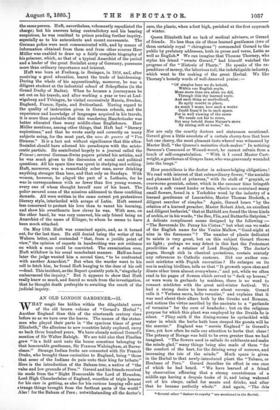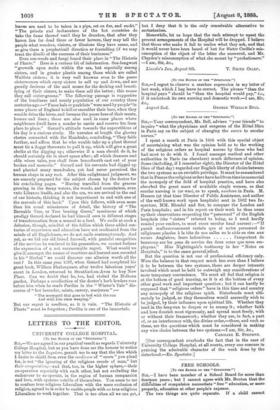AN OLD LONDON GARDENER.—II.
WHAT magic lies hidden within the dilapidated cover of the old brown volume of "Gerard's Herbal " ! Another England than this of the nineteenth century rises before us as we turn over the leaves. The names of the states- men who played their parts in "the spacious times of great Elizabeth," the allusions to new countries lately explored, carry us back three hundred years. We have already noticed Gerard's mention of Sir Walter Raleigh. We are told also that Fluellen grew "in a field next unto the house sometime belonging to that honourable gentleman, Sir Frances Walsingham, at Barne- elmes." Strange Indian fruits are connected with Sir Francis Drake, who brought these curiosities to England, being "those that some of the Indians do paie unto their king for tribute." Here is the introduction of the Balsam-tree, a native of "the vales and low grounds of Peru." Gerard and his friends received its seeds from the "Right Honourable the Lord of Hunsdon, Lord High Cha.mberlaine of England, woorthie of triple honour for his care in getting, as also for his curious keeping role and strange things brought from the farthest parts of the world." Alas ! for the Balsam of Peru ; notwithstanding all the doctor's
care, the plants, when afoot high, perished at the first approach of winter.
Queen Elizabeth had no lack of medical advisers, or Gerard of friends. No less than six of these learned gentlemen (two of them certainly royal " chirugions ") commended Gerard to the public by prefatory addresses, both in prose and verse, Latin as well as English.* We can imagine that Thomas Thorney, who styles his friend "sweets Gerard," had himself watched the progress of the "Historie of Plants." He speaks of the ex- penditure of money, the laborious toil, the indefatigable industry, which went to the making of the great Herbal. We like Thorney's homely words of well-deserved praise :—
"Of simples here we do behold, Within our English soyle,
More store than ere afore we did. Through this thy learned toyle.
And each thing so methodicall, So aptly coucht in place,
As much I muse, how such a worke Could fram'd be in such space.
For in well viewing of the same We neede not far to rome, Bat may behold dame Nature's store By sitting still at home," its.
Nor are only the courtly doctors and statesmen mentioned.
Gerard gives a little anecdote of a certain cherry-tree that bore but one cherry, the most pleasant taste wherof was witnessed by Master Bull, "the Queene's maiesties clock-maker." In noticing Saracen's Consound or Wound-woort, he cannot refrain from a touch of self-congratulation. "With it I cured Master Cart- wright, a gentleman of Grayes lune, who was greevonsly wounded into the lungs."
How punctilious is the doctor in acknowledging obligations !
We read with interest of that extraordinary flower, "the amiable and pleasant kind of primrose," with its stalk of "grayish, or overworne greenish, colour, which in the summer time bringeth foorth a soft russet huske or hose, wherin are contained many small flowers, found in a Yorkshire wood, by the industry of a learned gentleman of Lancashire, Master Thomas Hesketh, a diligent searcher of simples." Again, Gerard hears "by the relation of a learned preacher, Master Robert Abut, an excellent and diligent herbarist," that at Hatfield are found the three kinds of orchis, or in his words, "the Bee, Elie, and Butterffie Satyrion." A delicate compliment seems designed by the following :— " The Reverende Dr. Penny his Cistus ;" but what can we make of the English name for the Venice Mallow, "Good-night at nine in the forenoone " P The number of plants dedicated to saints is very great, but on this subject Gerard throws no light ; perhaps we may detect in this fact the Protestant proclivities of a retainer of Lord Burghley. The doctor's pages, though rich in classical quotations, contain scarcely any references to Catholic customs. Did our author con- nect mistletoe with Popish enormities P He enlarges on its use in making birdlime, tells us that "It groweth upon okes and diners other trees almost everywhere ;" and yet, while we often read in his pages of flowers which served to "deck up houses," or were worn in garlands by maidens, there is no word to connect mistletoe with the great mid-winter festival. We had a strong desire to learn more about vervain. Gerard calls it "Verbena sacra, holie vernaine," and explains that it was used about their altars both by the Greeks and Romans, and notices the virtue ascribed by the ancients to a " garlande of veruaine " for the cure of headache ; but on the religious purpose for which this plant was employed by the Druids he is silent. "Pliny saith if the dining-roome be sprinckled with water in which the herbs hath been steeped the guests will be the merrier." England was " merrie England" in Gerard's time, yet how often he calls our attention to herbs that cheer !
The potency of Borage was held to be even greater than we had imagined. "The flowers used in Ballads do exhilarate and make the minde glad," many things being also made of them "for the comfort of the hart, for the driuing away of sorrowe, and increasing the ioie of the minde." Mach space is given in the Herbal to that newly-introduced plant the " Tabaco, or Henbane of Peru." Gerard describes its effect in one case of which he had beard. "We have learned of a friend by observation affirming that a strong countrieman of a middle age having a dropsie tooke of it and being wakened out of his sleepe, called for meate and drinke, and after that he became perfectly whole." And again, "The drie
"Blieveral other "doctors to royalty" are mentioned in the Herbal.
leaves are used to be taken in a pipe, set on fire, and suckt." "The priests and inchaunters of the hot countries do take the fume thereof until they be drunken, that after they haven lien for dead three or fower hewers, they may tell the people what wonders, visions, or illusions they have scene, and so give them a prophetical! direction or foretelling (if we may trust the dinell) of the successe of their businesse."
Even sea-weeds and fungi found their place in "The Historie of Plants." Here is a curious bit of information. Sea-lungwort " groweth upon rocks within the sea, but especially among oisters, and in greater plentie among those which are called Walflete oisters; it is very well knowne even to the poore oisterwomen which carry oisters to sell up and down, and are greatly desirous of the said moose for the decking and beauti- fying of their (Asters, to make them sell the better; this mosse they call oister-greene." The following passage is suggestive of the loneliness and scanty population of our country three centuries ago:—" Fume bale or pucks " were used by people "in some places of England to kill or smoulder their bees, when they woulde drine the hives, and bereane the poore bees of their meate, houses and lines ; these are also used in some places where neighbours dwell farre a sunder to carrie and reserve fire from place to place." Gerard's attitude towards the superstitions of his day is a curious study. He narrates at length the gloomy stories connected with the Mandrake, concluding, "They fable farther, and affirm that he who wonlde take up a plant thereof must tie a dogge thereunto to pull it up, which will give a great shrike at the digging up; otherwise if a man should do it, he should certainly die in short space after; all which dreames and olde wines tales, you shall from hencefoorth cast out of your bookes and memorie." Gerard and his servants had digged up and planted many mandrakes, yet had never perceived the human shape in any root. After this enlightened judgment, we are scarcely prepared for the subject chosen by the doctor for his concluding pages. "Having travelled from the grasses growing in the fenny waters, the woods, and monntaines, even vnto Libanns itselfe, and also the sea, we are arrived to the end of our historie, thinking it not impertinent to end with one of the marnels of this land." Upon this follows, with even more than his usual minuteness of detail, the history of "The Barnakle Tree, or Tree bearing Geese," specimens of which prodigy Gerard declared he had himself seen in different stages of transformation from a mussel to a fowl. We smile at such a delusion, though, mindful of the follies which three added cen- turies of experience and education have not eradicated from the minds of all Englishmen, we do not smile contemptuously. And yet, as we bid our old friend farewell, with grateful recognition of the services he rendered to his generation, we cannot forbear the expression of a not unreasonable regret. What would we give if, amongst the names of courtiers and learned men recorded in his " Herbal " we could discover one allusion worth all the rest? In this same year 1597, when Gerard had completed his great book, William Shakespeare, after twelve laborious years' spent in London, returned to Stratford-on-Avon to buy New Place. Can we doubt that he, too, had visited the Holborn garden. Perhaps a recollection of the doctor's herb borders rose before him when he made Perdita in the "Winter's Tale" dis- course of "hot lavender, mints, savory, marjoram" :—
" The marygold that goes to bed with the son
And with him rises weeping."
But our regret is needless, as it is vain. "The Historie of Plants" must be forgotten ; Perdita is one of the immortals.



































 Previous page
Previous page